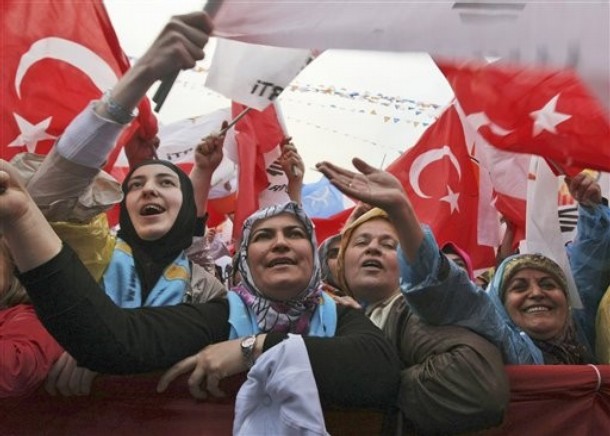
From Anthony Shadid, the New York Times: As Turkey heads to an election on June 12 — the size of Mr. [Recep Tayyip] Erdogan’s majority the only question — the country faces an Arab Spring, which took it by surprise ; ambitions that stretch beyond its means; and growing fears that Mr. Erdogan’s eight years in office have decisively shifted power from the old secular elite and toward his party and the merchant class, migrants and downtrodden that it courts.
But even his critics acknowledge that this country of 79 million is a far different place from the one he inherited, emerging as a decisive power in a region long dominated by the United States.
Though Turkey is still dogged by unemployment, its businesses are booming. In foreign policy, it is acting like the heir of the Ottoman Empire that preceded it, building relationships with Iran and Arab neighbors at the expense of Israel. . . .
There is a longstanding debate over whether Turkey has tilted east after decades of embracing the West as a NATO member and almost reflexive ally of the United States. It still nominally embraces the goal of joining the European Union, carrying out reforms mandated by the entry process that have made Turkey a far more liberal place.
But sensing a decline of American power in the region, Turkish officials have become sharply more assertive in the Middle East, priding themselves on keeping open channels to virtually every party.
The policy falls under the rubric of “zero problems” with its neighbors, though successes have been few. Problems remain with Armenia, and Turkey was unable to resolve the conflict in Cyprus, still divided by Greek and Turkish zones. Once serving as a mediator between Syria and Israel, its relationship with the latter collapsed after Israeli troops killed nine people onboard a Turkish flotilla trying to break the blockade of Gaza.
“The problem lies with Israel,” Mr. Erdogan said bluntly in an interview.
Its own officials admit that the Foreign Ministry remains too small for its ambitions as a regional power. At least $15 billion in investments were lost in the civil war in Libya. And Syria — viewed as Turkey’s fulcrum for integrating the region’s economy — faces a revolt that has tested Mr. Erdogan’s friendship with President Bashar al-Assad. While some see Egypt as a newfound ally of Turkey, others view it as an emerging rival in a region where Mr. Erdogan remains one of the most popular figures.
The optimism derives from Mr. Erdogan’s greatest legacy — an economy that has more than tripled since 2002 and whose exports have gone to $114 billion a year from $36 billion. Europe remains its pre-eminent market, but its businessmen have plied Ottoman trade routes with a sense of unabashed optimism at untapped markets. Many hail from Anatolia, sharing the party’s ideology of social conservatism and economic liberalism, with a hint of nostalgia for the old empire. (photo: AP)
Image: ap%206%201%2011%20AK%20supporters.jpg
